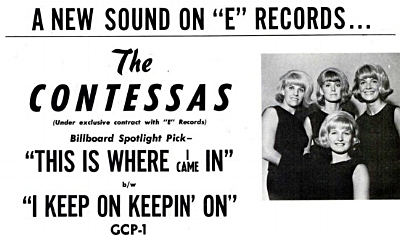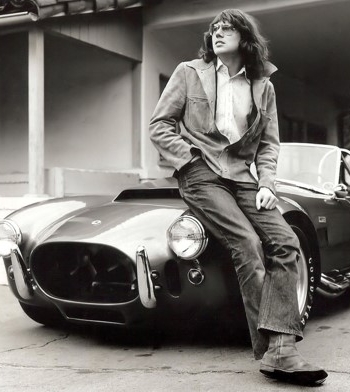Jimmy at Jobete: an intriguing Webb
‘They liked my big ballads’
By the time I get to St. James’s Church, he'll be singing…
Several thousand miles separate that London landmark, built in the 1670s, from the Sunset Vine Tower, constructed three centuries later, in Los Angeles. The songs of Jimmy Webb have been heard in both.
The power of that work was evident during Jimmy’s “The Cake and the Rain” concert in the British capital last month. The man in the pew in front of me at St. James’s Church was mouthing every line of every song. His partner seemed to know almost as many, and she rubbed his shoulder affectionately upon each song’s recognition. Others in this consecrated place were equally spellbound.
The Supremes with Jimmy Webb
More than 50 years earlier, it was in the Sunset Vine Tower that a younger Webb auditioned, striving to make a living from his music. There, he met the principals of Motown Records’ modest Los Angeles outpost: Hal Davis, Frank Wilson, Marc Gordon. He also hoped to interest them in the Contessas, a girl-group who had recorded his song, “This Is Where I Came In,” for a local label. In the event, Motown declined to sign the Contessas, but did offer Jimmy a writer’s contract with Jobete Music.
This talented man from Elk City, Oklahoma recalls those incidents in The Cake and the Rain, his recently published autobiography and the catalyst for the concert-cum-conversation at the London church. Earlier, he described Motown’s California crew as “the greatest people in the world.” They were “colour blind, selfless and generous.” He added, “I learned on the job there, but they liked my big ballads, and were less excited by the more ‘countryfied’ things I was writing.”
Most Motown pilgrims know of Webb copyrights like “This Time Last Summer,” recorded by Hal Davis under the pseudonym of Danny Day, and “My Christmas Tree,” cut by the Supremes for their Merry Christmas album. That seasonal song was “no threat to ‘White Christmas,’ ” Jimmy admitted to us at St. James’s. Yet his career was more entwined with Motown than that. He penned several of his best-known songs while at Jobete, although they became successful only after he left. These include “Galveston,” “Where’s The Playground Susie” and “Honey Come Back” – all hits for Glen Campbell – and they continue as part of the Jobete catalogue to this day. So does “Didn’t We,” as recorded tremulously by Richard Harris for his A Tramp Shining album.
Webb’s time at Motown shaped his future in other ways. Some while after Marc Gordon left the company in late 1965, he called the songwriter to help with the Versatiles, an act Marc was managing and was soon to become the 5th Dimension. (For more on this, check an earlier West Grand Blog, “Shapes and sounds on Sunset.”) Gordon put Webb in touch with singer Johnny Rivers and his new label, Soul City Records, to which the 5th were signed. From there, Jimmy’s career soared up, up and…well, you know.
In 1969, Webb wrote, arranged and produced Sunshower, a much-admired album by Thelma Houston on Dunhill Records. This was not a hit, however, and Houston’s search for success had to wait until she touched down at another music company: Motown. In 1972, Webb was employed directly by Berry Gordy’s business to create an album for the Supremes. In liner notes for a 2006 reissue of this album, Produced and Arranged by Jimmy Webb, he recalled lead singer Jean Terrell coming to the studio with a note from her doctor: “Dear Mr. Webb, can Miss Terrell be excused from singing anything above a high C for the next few days?” It was, the songwriter claimed, kind of a joke. “Almost.”
Today, a new compilation of rare and unissued recordings by the incomparable Brenda Holloway has brought Webb’s “This Time Last Summer” back into hearing range. Her 1964 recording of the song, produced by Marc Gordon and Hal Davis, is included in Spellbound, a collection curated by Paul Nixon and released on David Nathan’s SoulMusic label. (Also recommended: Sharon Davis’ liner notes for the set, based on a new interview with Brenda.)
In June 1965, it was Hal Davis’ own version of “This Time Last Summer” which came out on Motown’s V.I.P. label under the Danny Day name. The trade press was unimpressed, the verdict in Variety brutal: “Forget-it-sville.” Even so, the song survived. No less a star than Nancy Wilson recorded it on her 1975 album, Come Get To This.
After Jobete but before Soul City, Jimmy Webb toiled at what he called “a low-rent music studio” as a demo pianist, lead sheet maker and janitor. “As an added perk,” he writes in The Cake and the Rain, “the studio manager let me sleep in her spare room.” That manager was Madelon Baker, although she and her Audio Arts operation aren’t named in the book. No surprise, perhaps, considering that Webb and Baker subsequently sued each other over rights and royalties. Some of his songs were published by Ja-Ma Music, owned by Baker and her engineer husband, Jackson. This time in his life, Webb told the faithful at St. James’s Church, “felt more like farm labour than art.”
A young, upwardly mobile Jimmy Webb
Johnny Rivers bought Jimmy’s contract from Madelon Baker for $15,000 in order "to take me on as a writer.” The wages were $100 a week and a new car, until Webb became upwardly mobile – and much better rewarded – with the help of “Up, Up And Away,” “By The Time I Get To Phoenix,” “Wichita Lineman” and further remarkable hits. (For me, 1967's The Magic Garden by the 5th Dimension was the apex of his creativity.)
And Johnny Rivers? There was a Motown flavour to that career, too. The singer enjoyed back-to-back Top 10 hits with remakes of “Baby I Need Your Loving” and “The Tracks Of My Tears,” while his Soul City enterprise signed Willie Hutch as a songwriter. Another Soul City artist, Al Wilson, recorded “Do What You Gotta Do,” a Webb composition which climbed high in the British charts when later recorded by the Four Tops.
Jimmy Webb sang and spoke about “Do What You Gotta Do” at St. James’s. He called it “rudimentary” – although others might differ, given its affecting melancholy – but was clearly proud that it has endured, and that it was sampled only last year in Kanye West’s “Famous” with Rihanna and Swizz Beatz.
All things considered, Jimmy's work will last for even longer, whether played in London churches, Los Angeles office towers, the bars of Phoenix, Galveston and Wichita, or anywhere else. Yup, it’s the worldwide Webb.



